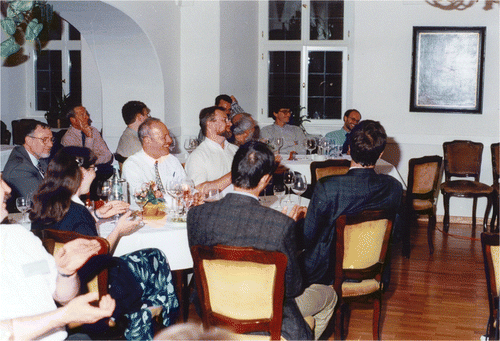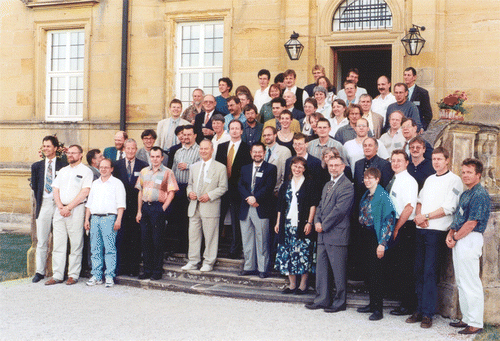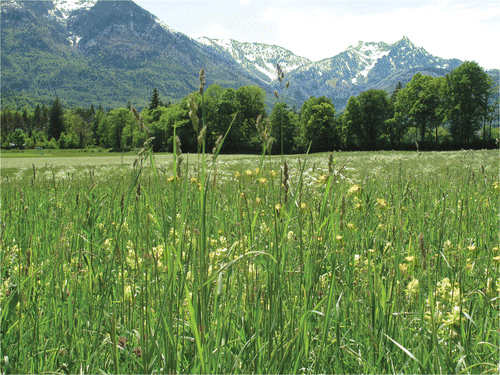On Saturday September 22, 2012, the world lost a great scientist, but for those of us who knew him well and were much influenced by his intellect and his kindness, we lost a colleague, mentor, and friend. Herr Professor Doktor Otto Hutzinger was my professor and one of the dominant influences on my life as he was for so many others. The time I spent with him in 1987 and 1988 in the Lehrstuhl in Bayreuth were two of the more interesting, intense, enjoyable, productive, and educational events of my entire professional life. It was certainly an intellectual hotbed of environmental chemistry and toxicology. The persons who passed through Otto's program reads like a veritable who's who of environmental Chemistry and Toxicology. I learned a great deal from him and I owe much of whatever meager success I may have acheived to his tutelage. Otto was in his 80th year and had lived a full life and left many of us as his legacy to the world. I can honestly say he was one of the true “characters” I have met in my life. He was smart, he was witty, he was diligent, he was driven, and he was well organized. With that set of skills he could be nothing but successful and that he was in everything to which he put his hand. While he had a long list of scientific firsts and successes, his legacy is all of us, those he mentored. In us and those we train, he and his ideals live on. I will not attempt to chronicle the life of Otto Hutzinger or give an extensive list of his many accomplishments, but through a few stories paint an image of the man I knew and loved. Perhaps, these glimpses of my relationship to this great man will bring back your own fond memories.
I have struggled for the past few weeks to try to put into word in English or German my feelings, both now and over the years. Here, I will try to the tell the story of Otto Hutzinger from my own perspective and how he touched my life, changed me forever, and left me with some fond memories. I will always remember the good times, the happy times. For many years I never saw Otto without that impish grin and his infectious laughter (Photo 1). He was a man who loved life and lived it to the fullest. He was happy when among his colleagues and friends (Photo 2).
Otto Hutzinger was trained as a Chemical Engineer and received his Diplom from Universität Wien in 1952. After working a few years in the pharmaceutical industry in Austria, in 1958 he emigrated to Canada and in 1965 received his Ph.D. in Chemistry from the University of Saskatchewan, in Saskatoon, where he learned to hate the cold. In 1965, Otto became a Canadian citizen which he held the rest of his life. After completing his Ph.D., he moved to Davis California where he spent two years as a postdoctoral fellow and fell in love with the Mediterranean climate. After his postdoc he took up his first position as a research Officer at the National Research Council of Canada in Halifax, Nova Scotia, where he worked on his first true love in chemistry, pharmaceuticals and in particular natural products. He held that post until 1974, but did a one year sabbatical leave at the Techniche Universität München. From 1974 until 1983, Otto was a Professor at the University of Amsterdam and Director of the Laboratory of Environmental and Toxicological Chemistry. It was in Amsterdam when I first met Otto in person. It was 1976 and I was only two years beyond my Ph.D. and was working as an Assistant Professor at the University of Georgia in the USA. I was keen to meet and learn from some of the top scientists in the world and at that time one of the hot topics was the newly discovered chlorinated dioxins. Otto was a pioneer in the area of formation of dioxins and their identification and quantification so I went to learn about these compounds. Thus began a career-long association with the man who would change my career forever.
Photo 1. Otto Hutzinger at “Otto Fest” a colloquium put on by his former students, postdocs, visiting scientists and friends at the time of his retirement in June of 1998. The author is sitting just to his left.

In 1983, Otto started the Lehrstuhl für Lehrstuhl Ökologische Chemie at Universität Bayreuth. It was there that I worked most closely with him and he had the greatest impact on the science. It is sort of funny how lives can have parallels. Who would have ever thought that I would end up my career where Otto started his? While I was in Bayreuth, Otto wanted me to stay on as a professor in the Lehrstuhl Ökologische Chemie of the Universität Bayreuth, but after much thought I decided to return to Michigan State University. Now, I am the Canada Research Chair at the University of Saskatchewan, which is where Otto's career started and my career will end. While in Bayreuth, from 1991 to 1996 Otto got more and more involved in policy, in working to transfer the technology that he had developed and the understanding that he had gained to development of better public policy relative to trace substances in the environment. He was during that time the Scientific Director of the Bavarian Institute for Waste Research in Augsburg Germany. In 1998, Otto was forced to retire from his position as professor in Bayreuth. He was beginning to be afflicted by the neurological disease that would ultimately take him from us. But he remained active still attending scientific meetings and presenting papers and presiding over journals until just a few years ago
Otto was actually most happy when working alone with his books. He loved books and for any of you who have had the opportunity to visit his offices or home you know that they were filled with books, books of all types: in many languages, on many subjects, not just chemistry or even science, but history, music, and religion. That was a true reflection of this renaissance man. I have enjoyed many evenings over some beer or wine or Scotch discussing world history, geography, and languages. He dearly loved these discussions and while I knew he was special and my time with him was special, it is only now that I can begin to judge the depth and magnitude of the man, and the influence he had on me and my life. Otto grew up in wartime Austria and was a passionate pacifist who hated war and shunned any type of confrontation. He was among the most gentile of souls I have ever known.
As many of you will know Otto loved journals and in particular loved creating new journals and during his career he created several, which have gone on to become highly regarded International Journals, Environmental Science and Pollution Research, Chemosphere and of course Toxicological and Environmental Chemistry of which I am still on the editorial board. I took on the tasks as editor or member of the editorial boards of these three journals as a favor to Otto and it grew to be a big part of my life. From reading all of the manuscripts we considered I learned a lot and from working with the many authors from around the world, I got to know most of the practitioners of Environmental Toxicology and Chemistry throughout the world. Thank you Otto. I know you would be very proud of the progress that your journals have made.
Otto was very well known, famous even, throughout the world, but the Otto I knew and loved was a very private man and had no vanity in him. He did for others out of pure goodness, never expecting anything in return. He shared his wealth, the adulation of the successes of the laboratory, and unstintingly of his time. He gave those who studied with him freedom, absolute freedom to follow wherever the science took them. He was always supportive and willing to share his thoughts, but you always came away with the feeling that you had arrived at the best solution of your own accord. In that way he helped instill the confidence in all of us to always question, the literature, each other, and him. But always in a way that demonstrated complete respect and treated everyone, especially our doubters and detractors with the dignity they deserved.
Of all the things Otto did, the one I think with which most people associate the name is the starting of the Dioxin meetings. I had the honor of assisting in helping organize one of those meetings while I was living in Bayreuth. I still go to the meetings as frequently as I can. The purview has enlarged over the years to include more than just dioxins and furans. Through these meetings I have come into contact with some of the greatest practitioners of our science that I have ever known. I have gotten to know them not only as scientists but as people and have had the opportunity to do studies and publish books and manuscripts with many of them. Again, for all of us who have enjoyed those meetings and used them to our professional advantage over the years; Thank you Otto!
Otto Hutzinger was a scientific giant in life and a legend in death. He made a number of discoveries and contributions and will long be remembered for his scientific acumen. But many of us will remember the other Otto, the one who loved to organize parties that lasted all weekend. We would take over a castle, all dress in medieval costume, and stage mock battles and abductions and rescues of beautiful maidens. We would have great dinners and earnest discussions. Of course, there was the annual Fasching party where we all dressed up – I went one year as a “gas chromatograph.” At Christmas, Otto always had a big dinner party for everyone at his house. He had a real Christmas tree with real lighted candles on it. Every year Otto was so nervous that he stood by the tree with buckets of water. I once asked him why he did it if he was so worried about a fire and his response was, “it just wouldn't be Christmas without the real candles – I just love them.” When all of his former students, postdocs, and scientists snuck into Bayreuth to surprise him on the occasion of his retirement, he did not know we had secretly gone into the back of the lecture hall in the dark and when he came to give his retirement lecture and the lights came up, he saw all of us giving him a standing ovation – he was moved to tears – it was a very moving moment for all of us. So there was that sentimental side of Otto that few ever got to see. Then, there was the time when someone from the lab was flying to their first scientific congress in America and had never been on an airplane, so Otto bought him a ticket to fly from Bayreuth to Hof, a distance of about 80 km so that he could get some flying experience. We all drove in cars and met him when he landed and had a big dinner party. Of course every year we had Wandertag (hiking day) when we walked a few hours into the mountains around Bayreuth and then stopped at a guesthouse and drank beer and chatted the whole day through. It was at one of these hiking trips that I took a liking to Weizen Bier (wheat beer). Otto hated it, drinking only Pils Bier, and when I asked what gave it the unique taste Otto explained that it was phenol. He thought it was hilarious that I did not know it was phenol. His wife, Freda always liked it when I came to visit because I was “good for Otto because you get him out walking in the mountains and getting some fresh air and away from all of his books.” She said “he always get so excited when you come to visit!”. She thought it was because of the stimulating scientific discussions, when in reality Otto and I would walk only to the next village Rödensdorf and eat Schmalzbrot and drink beer. Since Freda did not let Otto take his wallet she thought we would behave, but of course I always had money. That was this complex yet simple man who had this pleasantly “naughty” side that endeared him so to all of us. He was this great man, but he could let his hair down and be just a regular guy. He always treated all of us as his equal with dignity and respect. We all knew that he loved us and that our time with him was special. I think that it is these qualities that made us love him so much and now miss him so.
I had not seen Otto for a few years, but for some reason this last summer, I felt compelled to visit him and his wife Freda, a life-long companion and friend, at their home in Pfandl (Bad Ischl) Austria. Though his condition had deteriorated, we had a good time. He remembered many of our “adventures” over the years and we had some laughs together. It was good to have the “old” Otto back if only for a brief time. He was cracking jokes and was quite pleased with the humor he had produced. That is how I will remember him, battling to the end and doing it with style and grace. I remember him and honor him in my daily life and when I work with my students, postdocs, and research scientists, I frequently relate information and stories I learned from Otto. Otto and his unique style live on in all of us who loved him. Otto, thank you from all of us who have known you and, may you always enjoy your beautiful Alpenblick (Photo 3).
John P. Giesy
Saskatoon, SK, Canada
Email: [email protected]
November 5, 2012

